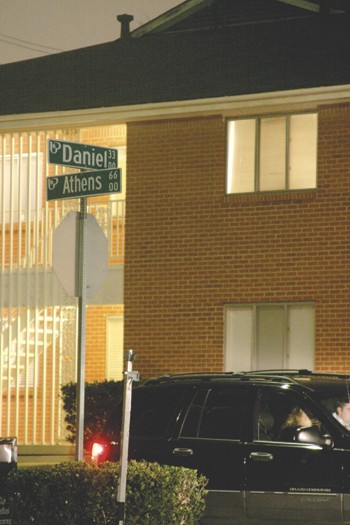
University Park will start enforcing the 1985 law that states that no more than two unrelated people can live in an apartment. (Christina Parrish)
When sophomore Courtney Dwight signed a two-year lease on a house in University Park, she never imagined she’d be evicted a year later.
In less than five months, Dwight will lose her lease on a three-bedroom home west of Snider Plaza – not because of loud late-night parties, not because she failed to pay the rent, but because she lives with three other girls.
“The situation is unfortunate, because we did have a two-year lease and we didn’t have a noise violation. It’s unfair that people are getting mad at us for living close to campus when our neighbors are choosing to live near university property, and now we have to find a new place to live that won’t be as close and we won’t be able to walk to class,” said Dwight.
Several SMU students face a similar situation.
On Dec. 19, the City Council of University Park unanimously voted to begin enforcing the Comprehensive Zoning Ordinance relating to dwelling-unit occupancy.
Official notices mailed on Jan. 15 alerted property owners of the city’s change in tolerance.
A dwelling unit as stated in the ordinance is “a building or portion of a building which is arranged, occupied, or intended to be occupied as living quarters by an individual or one family.” A family is defined as “any number of individuals living together as a single housekeeping unit, in which not more than two individuals are unrelated by blood, marriage, or adoption.”
This ordinance, developed before 1989, has rarely been enforced. The current City Council members decided to address the issue after five complaints concerning noise, parking and trash. Beginning June 1, occupancy violations will be penalized with a fine of $2,000 per day to property owners violating the law, according to The Dallas Morning News.
“The city has, for a number of years, been diligent in informing all property owners about the ordinance,” said Steve Mace, the community information officer for University Park. “Over the last year or two the city has been more relaxed in dealing with the ordinance, but with the increasing number of complaints the City Council decided to become vigorous in their actions.”
Michael Corman is among the non-student residents living north of campus whose complaints to the city have prompted enforcement of the ordinance.
In an e-mail complaint, Corman said, “I am entitled to walk my dog at night without having to deal with a bunch of loud and perhaps drunk 20-year-olds on the street where I live and pay taxes. I thought this to be a quiet and safe street when I bought this house four years ago. Things have changed for the worst.”
Mace disagrees. He feels the area is safe now, regardless of student residents.
Mace said six or seven areas in University Park are Multiple Family Zones, which allow for town homes, apartments and condominiums.
Streets north and west of campus such as Daniel, Airline, Rosedale, Granada and McFarlin all fall within the specified zoning areas.
Rent on these streets for a two-bedroom apartment begins around $1,400 and three bedrooms can reach up to $3,000 a month – a steep price for most students.
Parking, not the students, is the focus of the ordinance according to Mace.
In the multiple family zones, especially near Snider Plaza, street parking has always been an issue, even when school is not in session.
However, he did note that UP police respond to about two loud parties per week.
Sophomores Karanne Balderston, Cheyenne Rogers and Alisa Windle live together on Milton.
They were planning to re-sign their lease for the next school year, but can’t now because of the ordinance.
“Rent is expensive because the land value is so high, so to make things more affordable we have three people living in a two-bedroom apartment. People who want to live next to the university will find a way to make it happen,” said Balderston. Rogers, an SMU political science major, was less understanding of the city’s arguments about lack of parking, too much trash and too much noise, saying, “I refuse to believe that this is about anything other than the students. This city is all about appearances, and the older residents don’t want college-age students parading around their streets.”
Next fall students who wish to live with multiple, unrelated roommates will have to look outside of University Park.
Neither Dallas nor Highland Park has passed an ordinance preventing more than two unrelated persons from living together.
When asked if he thought the apartments would be vacant because of lack of students renting in the area, Mace replied, “I can only assume that because a good number of people desire to live in University Park, [the apartments] won’t be left empty.”
Rogers disagrees. “In these apartments we don’t pay for quality, we pay for location, and I think owners will have a hard time finding apartments so close to the university without lowering the rent because non-students don’t need to pay high prices to be next to the university.”








